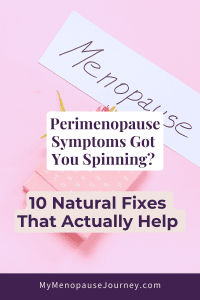Symptoms of perimenopause can sneak up on you — they did for me.
Was it what I needed? Well, let’s just say that from the outside, it looked like an exciting new chapter. But inside, I felt like I was coming undone.
I’d swing from tears to laughter in a single afternoon. I’d snap at my husband, then cry. I felt tense, edgy, and not at all like the person I knew myself to be.
And here’s what I wish someone had told me back then: running headfirst into perimenopause with marathon training? Not recommended.
That’s what I did, and honestly, it made everything worse. The physical and mental stress just amplified the mood swings, the fatigue, and the “What on earth is happening to me?” moments.
So, if you’re in your late 30s or early 40s, and finding yourself moody, restless, bloated, or suddenly wide awake at 3 a.m., you might be experiencing the symptoms of perimenopause, too.
And trust me, you’re not going crazy.
Your hormones are shifting — and your body is simply calling for some extra care.


- 8 Common Perimenopause Symptoms (and How They Show Up in Real Life)
- 1. Changes in your periods
- 2. Mood swings, Anxiety and Depression – “Not Yourself”
- 3. Vaginal Dryness & Changes in Intimacy
- 4. Sleep That Plays Hard to Get
- 5. Bloating and Digestive Surprises
- 6. Skin, Hair & Nail Changes
- 7. Hot flashes
- 8. Night Sweats
- Hot flashes, brain fog, mood swings… tired of guessing what’s going on? The Menopause Clarity Kit shows you the way back to calm + control.👉 Check out the Menopause Clarity Kit
- Behind the Scenes: Why Perimenopause Feels the Way It Does
- 10 Natural Ways to Relieve Symptoms of Perimenopause
- The Bottom Line
- FAQs About Perimenopause Symptoms
8 Common Perimenopause Symptoms (and How They Show Up in Real Life)
1. Changes in your periods
Ah, the periods. Just when you thought you had them figured out — boom! They start playing hide-and-seek. Some months they show up early, some months late, and sometimes, not at all.
Then they return with a vengeance just when you’ve packed away the “supplies.” Aunt Flo becomes heavier. And yes, even with all this chaos, pregnancy is still possible.
2. Mood swings, Anxiety and Depression – “Not Yourself”
This was my personal rollercoaster. I could go from zero to tears in seconds. One moment I’d be laughing at a silly joke, the next I was convinced my husband was flirting with the waitress (he wasn’t).
3. Vaginal Dryness & Changes in Intimacy
Not the most glamorous topic, I know, but it’s real. Very real. And yet, almost no one talks about it.
Nothing’s wrong with you — it’s the estrogen decline causing natural lubrication to decrease. Cue the awkwardness in the bedroom… and add a dip in libido.
Suddenly, intimacy feels more like another to-do list item than a treat. It’s not that you’ve “lost your spark.” It’s just that your hormones didn’t get the memo.
4. Sleep That Plays Hard to Get
If I had a dollar for every woman who told me, “I used to sleep like a baby, and now I’m up at 3 a.m. scrolling recipes for gluten-free muffins,” I’d be rich.
Progesterone — the calming hormone — dips in perimenopause, leaving your nervous system on high alert. Add in the other stressors, and sleep can feel like a luxury.
5. Bloating and Digestive Surprises
In midlife, your old favorites — a glass of wine, a slice of pizza, even a piece of bread — can leave you feeling like a balloon. I used to joke that my jeans had become mood rings: they got tighter depending on what I ate.
Gluten, dairy, and sugar are common culprits, but stress and hormonal fluctuations play a role, too.
6. Skin, Hair & Nail Changes
Remember when you could just slap on a bit of moisturizer and be good to go? Ah, the good old days.
Now, with collagen production slowing, skin feels drier, hair loses its shine, and nails break more easily.
And just to keep things interesting, you might notice thinning hair not just on your head, but elsewhere too.
7. Hot flashes
It’s like your body suddenly decided to install an internal sauna. One minute you’re fine, the next you’re peeling off layers like you’re in a strip show you didn’t sign up for.
Some women barely experience hot flashes though, while others can have them often. It is mainly influenced by lifestyle, diet, stress levels, your environment, and in some cases, ethnicity!
8. Night Sweats
Like hot flashes, they bring out the heat you didn’t know you had in you. But night sweats sneak up while you’re sleeping — and leave you drenched, annoyed, and fumbling for dry sheets at 2 a.m.
Who needs Netflix when your own hormones provide nightly drama?
Hot flashes, brain fog, mood swings… tired of guessing what’s going on? The Menopause Clarity Kit shows you the way back to calm + control.
👉 Check out the Menopause Clarity Kit
Behind the Scenes: Why Perimenopause Feels the Way It Does
Your symptoms aren’t random. They all come back to one key player: your hormones. And during perimenopause, they start changing the script.
Here are the major hormones playing main character energy and supporting roles:
Progesterone
Progesterone is usually the first hormone to become erratic as we enter perimenopause — and that shift can be felt in all sorts of surprising ways.
This hormone plays a key role in calming the nervous system, supporting sleep, stabilizing mood, and balancing the effects of estrogen. But as progesterone levels begin to dip or fluctuate, that balance gets thrown off — and we may start to experience mood swings, anxiety, heavier periods, breast tenderness, bloating, and weight gain.
Even though estrogen hasn’t changed much at this stage, the loss of progesterone’s steadying effect can make estrogen feel overpowering. This is often what’s behind what’s called estrogen dominance — not that estrogen is too high, but that progesterone is too low in comparison.
Perimenopause can feel unpredictable because of this. It’s not linear, and it’s not just “one thing.” Hormones rise and fall — and progesterone is usually leading that dance.
Estrogen
Estrogen tends to stay fairly stable throughout much of perimenopause — but it can fluctuate. That’s why we still get PMS-like symptoms, like irritability or breast tenderness, even if cycles are irregular.
It’s only later — toward the end of perimenopause or after menopause — that estrogen begins its more consistent decline. This drop brings with it a new set of symptoms, including vaginal dryness, joint stiffness, brain fog, hot flashes, and changes in skin elasticity.
So if the earlier years felt like an emotional whirlwind, the later years can feel more like a slowdown — lower energy, drier tissues, and new discomforts we haven’t had to think about befor
Testosterone
Often overlooked, but this hormone matters too (and yes, it’s not only for men). As testosterone dips, you’ll likely notice a drop in motivation, muscle tone, and even libido.
Your Other Glands
Thyroid, pituitary, and adrenals — they all get in on the act, too.
When estrogen and progesterone wobble, these glands can feel the pressure — adding fatigue, brain fog, and changes in metabolism to the mix!
10 Natural Ways to Relieve Symptoms of Perimenopause
Now for the good news: while we can’t cancel perimenopause, we can make it much easier to handle.
These are the things I wish I had known when I was running straight into the gates of midlife — let me share them with you!
Nourish Yourself with Real Food
Think of food as the raw material your hormones need:
Protein and healthy fats give your body the building blocks it needs to stay balanced, truly nourished, and energized. They also help stabilize blood sugar, support hormone production, and keep you full for longer (goodbye snack attacks and cravings)!
Swap the boxed snacks, processed foods, sugary treats, and drive-thru dinners for colorful veggies and guilt-free snacks — like nuts, seeds, avocados, and berries!
Citrus fruits, papaya, bell peppers, and leafy greens are loaded with vitamin C and other essential nutrients needed to support progesterone production.
And yes, you’ll notice the difference — in your mood, your energy levels, and your jeans!
Try Adaptogenic Herbs
Ashwagandha, holy basil, rhodiola… think of them as little cheerleaders for your stressed-out body.
They don’t “fix” perimenopause symptoms, but they do help smooth the edges. I used to sip ashwagandha tea before bed — it was like handing my nervous system a warm, cozy blanket.
Explore Seed Cycling
Pumpkin, flaxseeds, chia, sesame… these little seeds aren’t just Instagram-pretty.
They help your body process hormones better and flush out fake estrogens (those pesky xenoestrogens hiding in our food and products) that can mess with your natural balance!
Add Key Supplements
Magnesium with taurine was a lifesaver for my sleep and my sanity. B vitamins kept my energy from crashing mid-afternoon. 5-HTP was the one that gave me a gentle lift when the mood dips hit.
Of course, we still need to prioritize getting real nourishment from natural food sources. But while supplements can’t provide everything, they can make a world of difference if you need that extra boost!
Move Daily — In Ways You Enjoy
Forget punishing yourself with workouts that do nothing but drain you.
Like I said earlier, doing something too high intensity (a long trail run, in my case) if you’re already stressed out can only worsen symptoms.
A walk in the fresh air, some yoga, or even dancing around the kitchen counts.
Strength training, for me, is also within a healthy range — your bones and metabolism will thank you!
Consider Natural Progesterone Cream
Progesterone creams from wild yam or soy can help some women rebalance. They won’t turn back the clock, but they sure can take the sting out of hot flashes or nights sweats — and help you get better sleep!
But hey, while these creams are a gentle, natural option to take the edge off, not every woman responds the same. It’s always best to talk to a healthcare provider who understands hormonal health.
Stress Less, Recover More
Your body can’t handle too much stress and perimenopause at the same time without consequences.
Try to delegate, say no without guilt, and don’t be afraid to step off the hamster wheel. It’s not selfish — it’s survival. And most importantly, it’s for your own thriving. A relaxation doesn’t have to be an expensive trip to the Bahamas (though I won’t stop you if you have the means)!
Deep breathing exercises, meditation, and journaling are things you can always do for free… anytime, anywhere.
Five minutes of deep breathing can lower cortisol faster than scrolling social media ever will. I sometimes set a timer, close my eyes, and just breathe. It feels simple — but powerful.
Try Acupuncture or Aromatherapy
Acupuncture can feel like magic for calming nerves and balancing energy. But if needles aren’t your thing, aromatherapy or getting a massage (with essential oils) can work wonders, too!
Make Sleep a Priority
Yes, I saved the best for last: sleep. It’s not just rest — it’s your body’s built-in repair system, your emotional reset button, and your best defense against the hormonal chaos that perimenopause loves to stir up.
When you’re sleeping well, everything works better — your mood, metabolism, immune system, even your skin.
So, treat sleep like gold. Create a bedtime ritual that feels less like a shutdown and more like a wind-down. Soft lighting. A good book. No doom-scrolling. Maybe a cup of calming herbal tea or a warm shower.
Dim the lights an hour before bed to signal to your brain that it’s time to shift gears. And if it helps, imagine you’re not just getting ready for bed — you’re tucking your hormones in for the night, telling them gently: “Shhh. We’ve done enough hustling today, besties.”
Is it always easy? Nope. Perimenopause loves to make sleep feel like a moving target. But making it a priority — even just committing to consistent sleep and wake times — can make a real difference.
Your body needs that rhythm to reset, recharge, and regulate.
The Bottom Line
Perimenopause may feel like a storm you didn’t see coming, but it’s not here to take you down — it’s here to show you what your body needs now… so you can rise and unleash that midlife glow.
With the right food, movement, rest, and self-care, this season can become less about “losing control” and more about finding a new rhythm that truly supports you.
FAQs About Perimenopause Symptoms
Q: What are the first signs of perimenopause?
A: The earliest signs are usually changes in your menstrual cycle — periods that become irregular, lighter, heavier, or skip altogether. Mood swings, trouble sleeping, and bloating are also common early signals.
Q: How long does perimenopause usually last?
A: Most women experience perimenopause for about 4 to 8 years, though it can be shorter or longer depending on your lifestyle and current health status.
Q: Can I still get pregnant during perimenopause?
A: Yes, ovulation is unpredictable but still possible during perimenopause. If pregnancy is not your plan, you’ll want to continue using protection until you’ve been period-free for a full year.
Q: Do all women get hot flashes in perimenopause?
A: Not at all. Some women get them frequently, others only during menopause, and a lucky few escape them altogether.
Q: What’s the best way to ease perimenopause symptoms naturally?
A: Most women find relief by focusing on three areas: nourishing foods, stress management, and good-quality sleep. Supplements, herbs, and gentle movement can add extra support.
References:
nature.com/articles/s44294-025-00061-3
pmc.ncbi.nlm.nih.gov/articles/PMC4834516/
pmc.ncbi.nlm.nih.gov/articles/PMC6082400/
bmj.com/content/382/bmj-2022-072612
health.harvard.edu/womens-health/perimenopause-rocky-road-to-menopause
mdpi.com/2673-4184/5/1/4
jneuroinflammation.biomedcentral.com/articles/10.1186/s12974-020-01998-9
drnorthrup.com/perimenopause-transition/
academic.oup.com/edrv/article/19/4/397/2530801
amjmed.com/article/S0002-9343(05)00885-5/fulltext
my.clevelandclinic.org/health/articles/what-is-perimenopause-menopause-postmenopause


Gita is the founder of My Menopause Journey. Since 2014, she has been supporting midlife women by sharing hard-earned learnings from her own experience. To advance her knowledge, Gita puts a lot of her time and effort into understanding the broad spectrum of women’s health. She immerses in extensive research about the physical, mental and emotional aspects of menopause. Gita believes in the life-changing power of healthy, holistic living — this is where she anchors her message to all women. Learn more about her marvelous mission in About us - My Menopause Journey.




